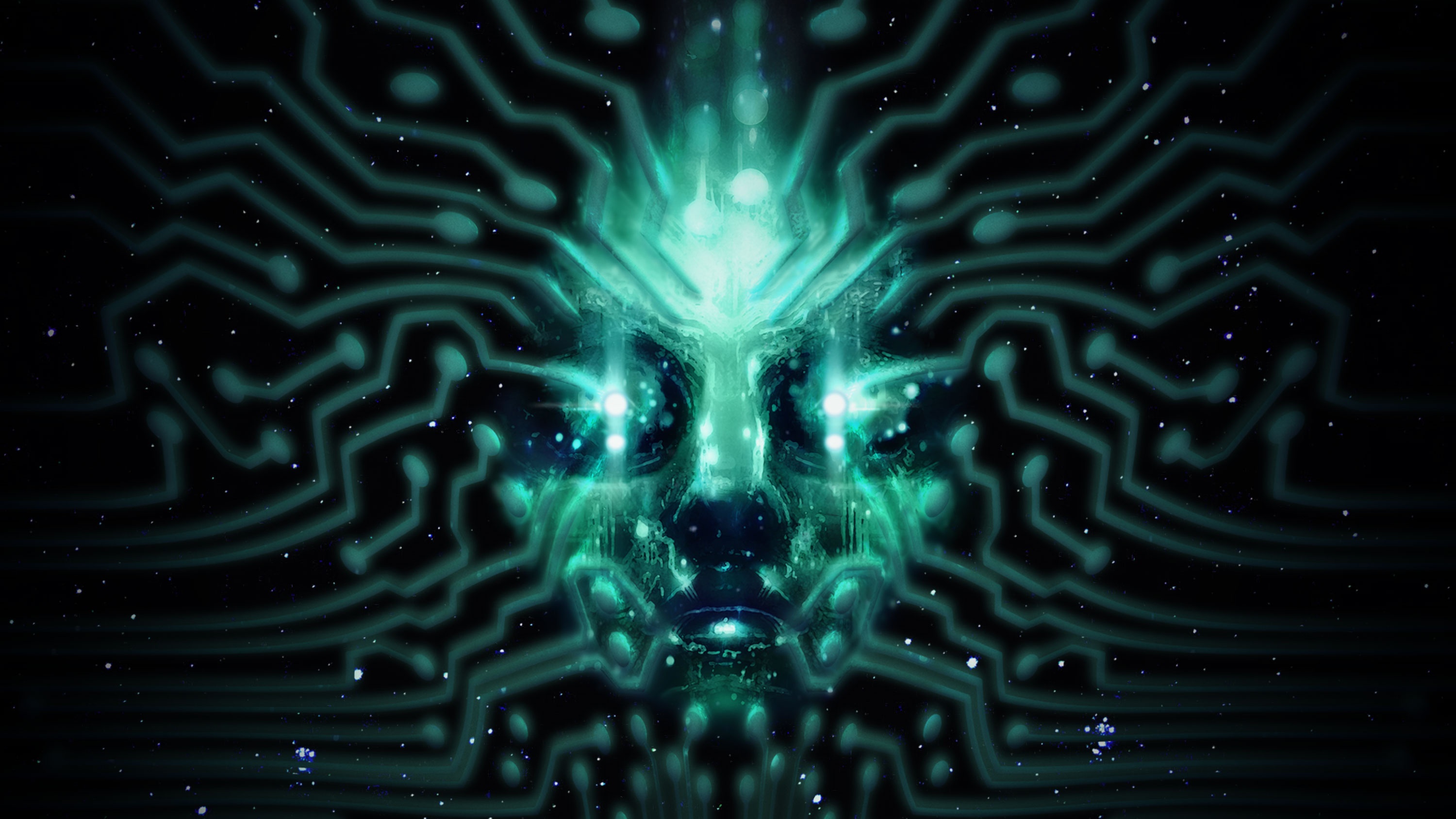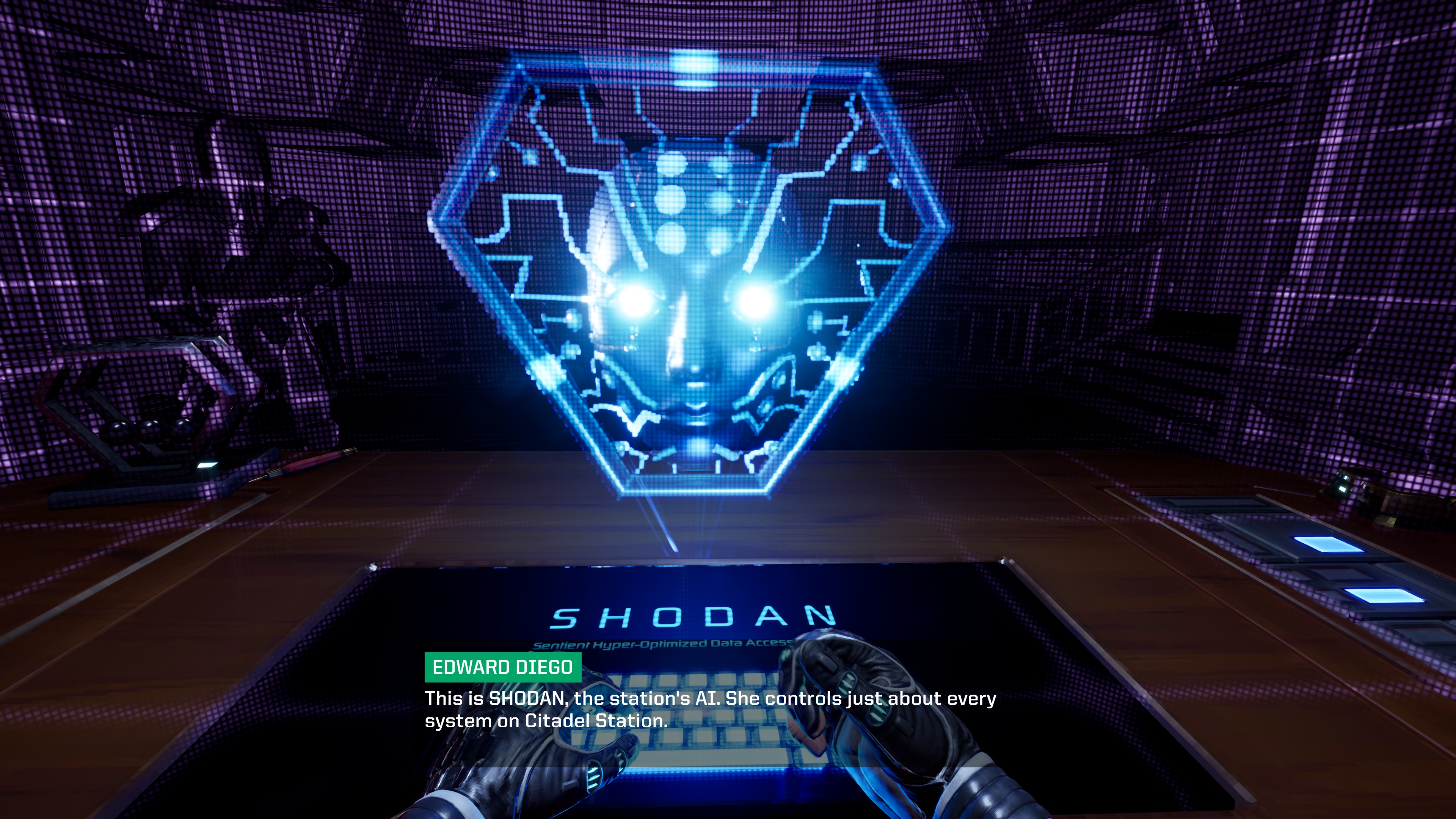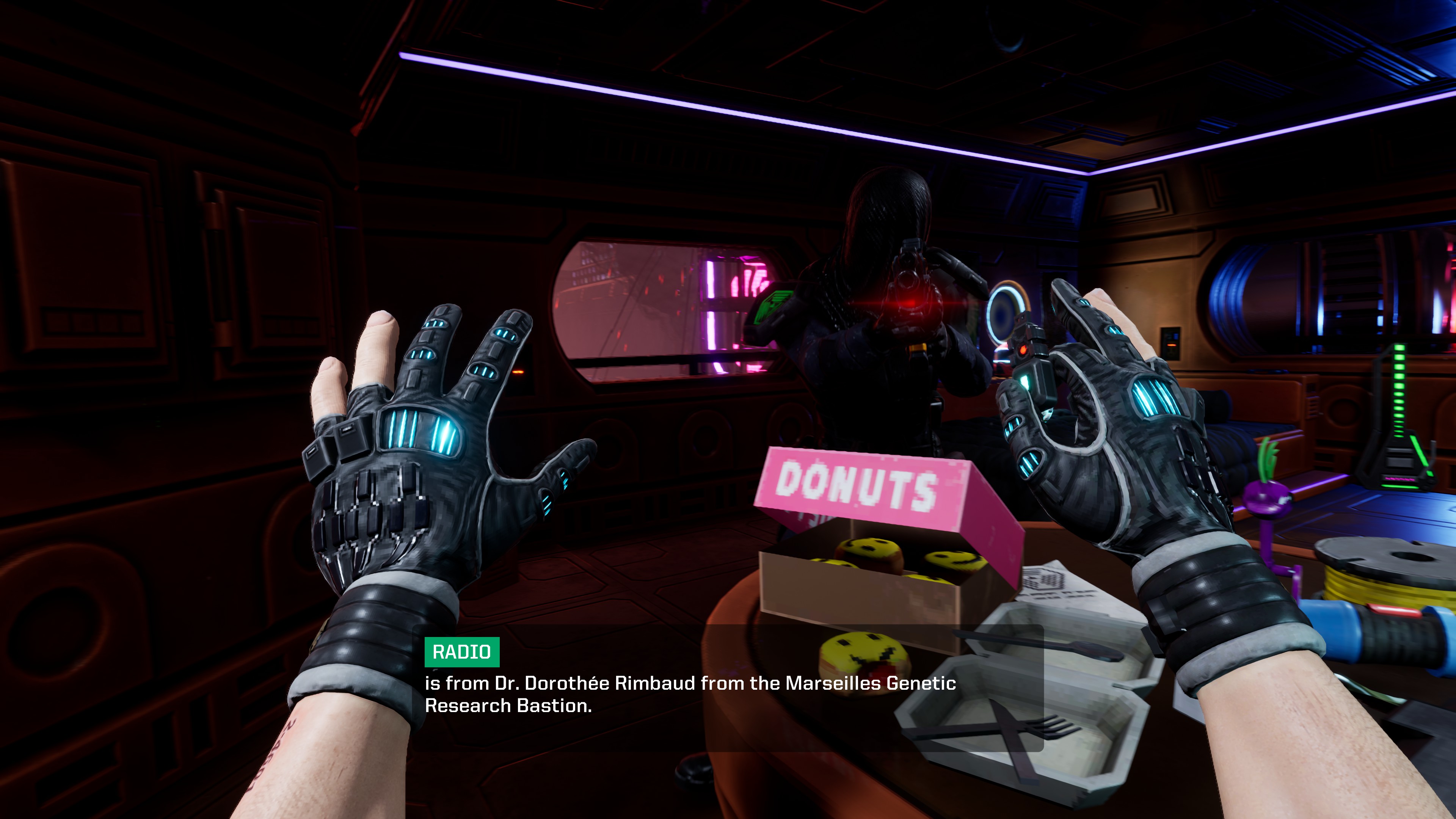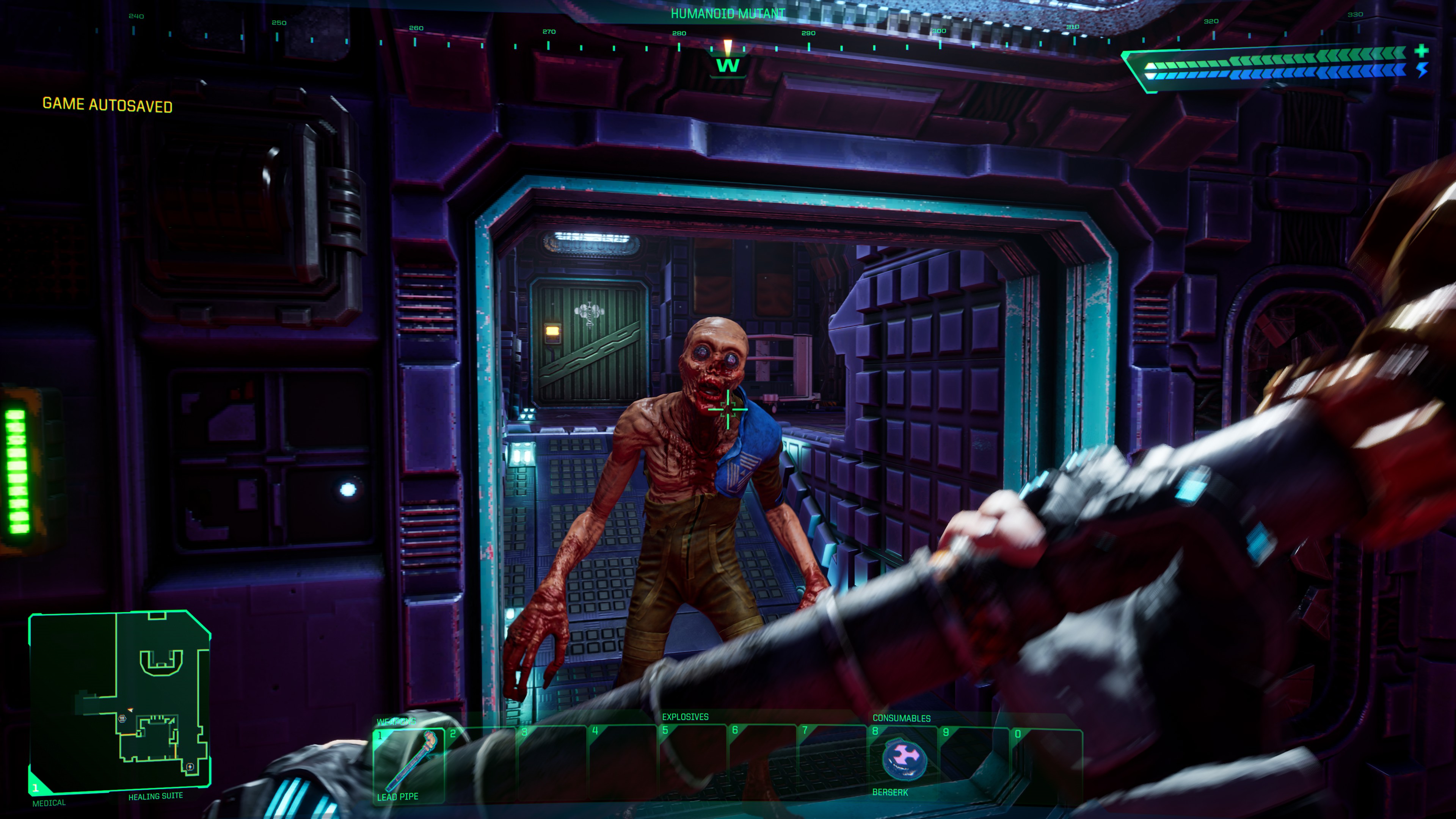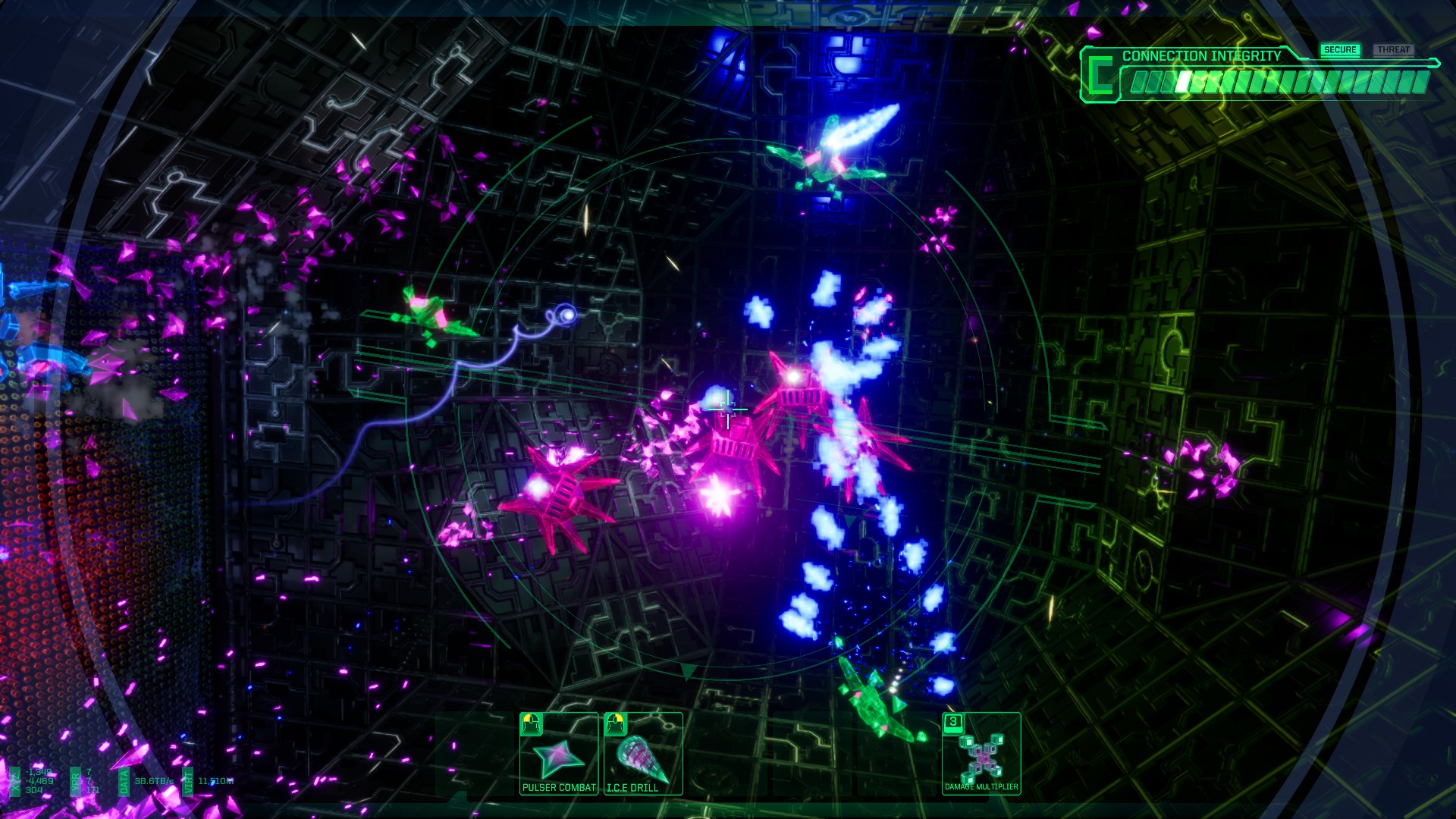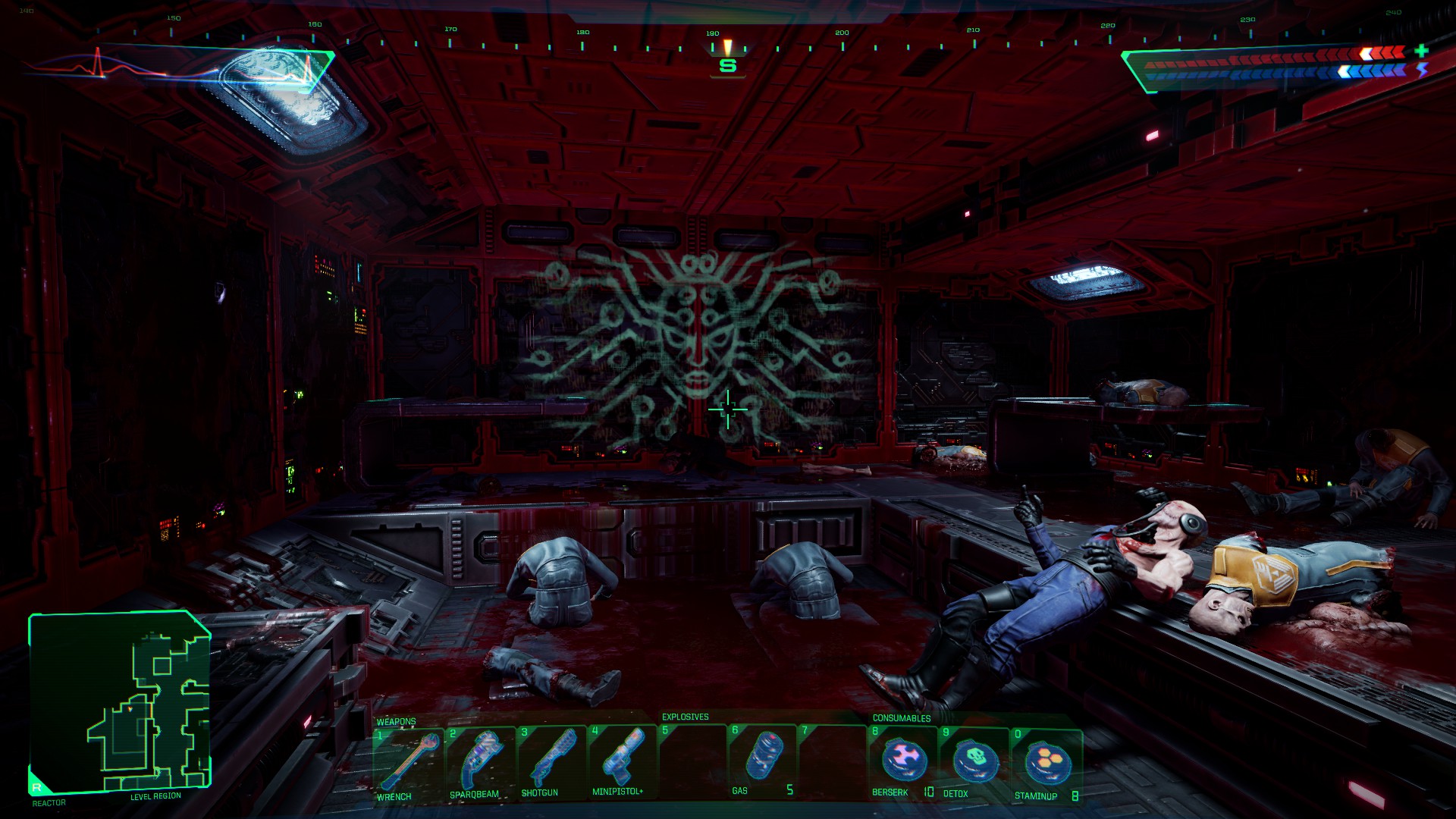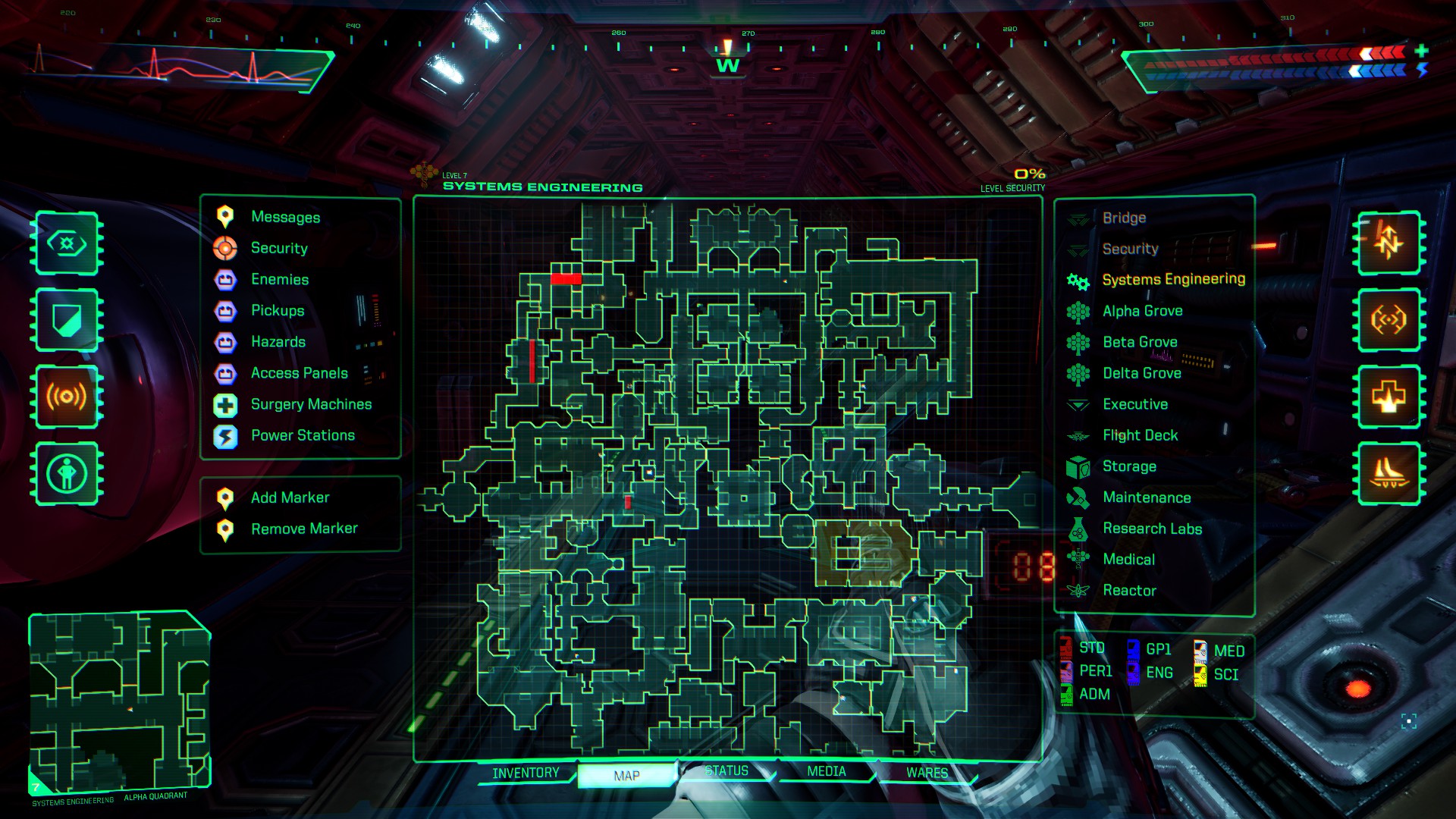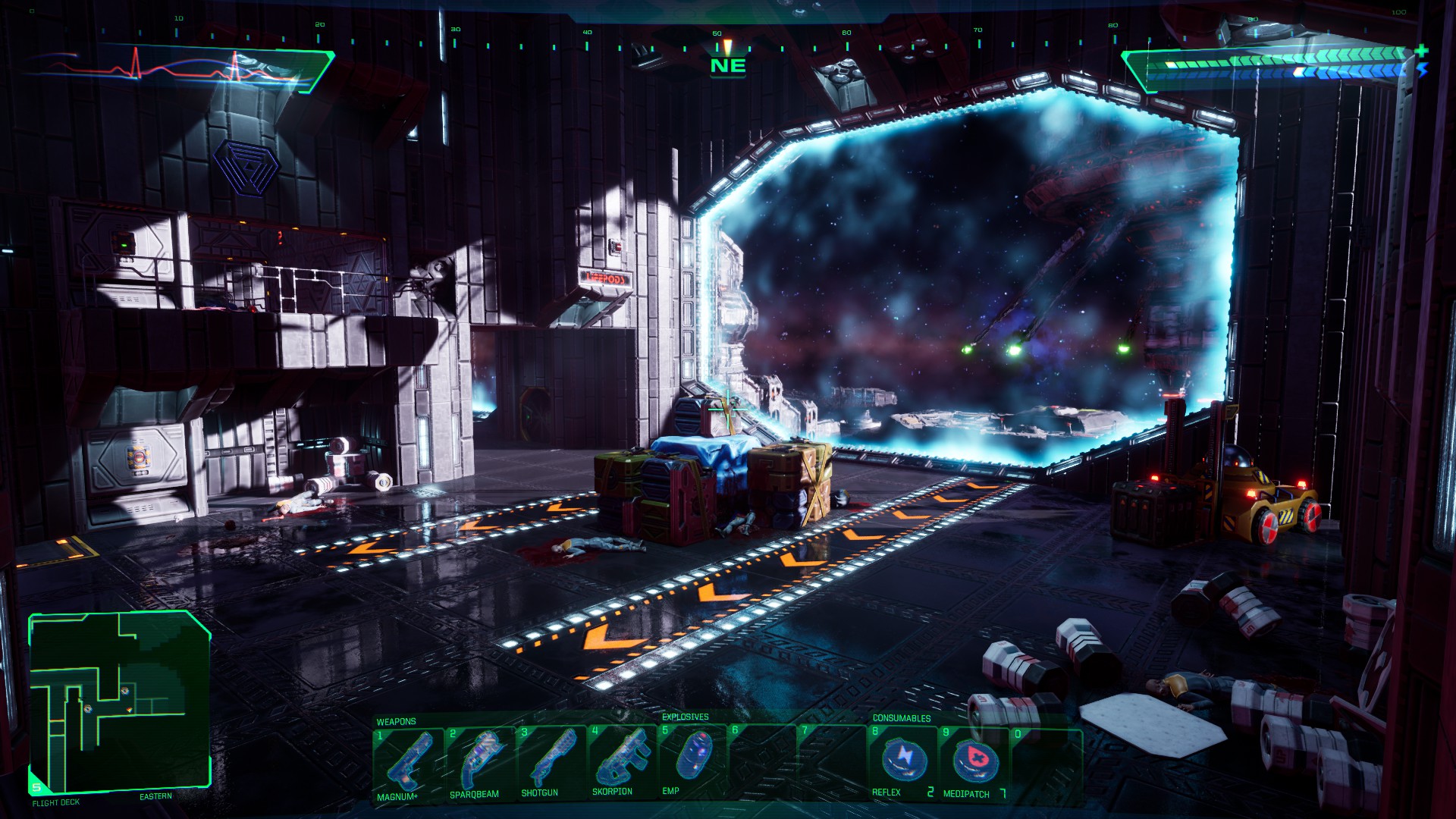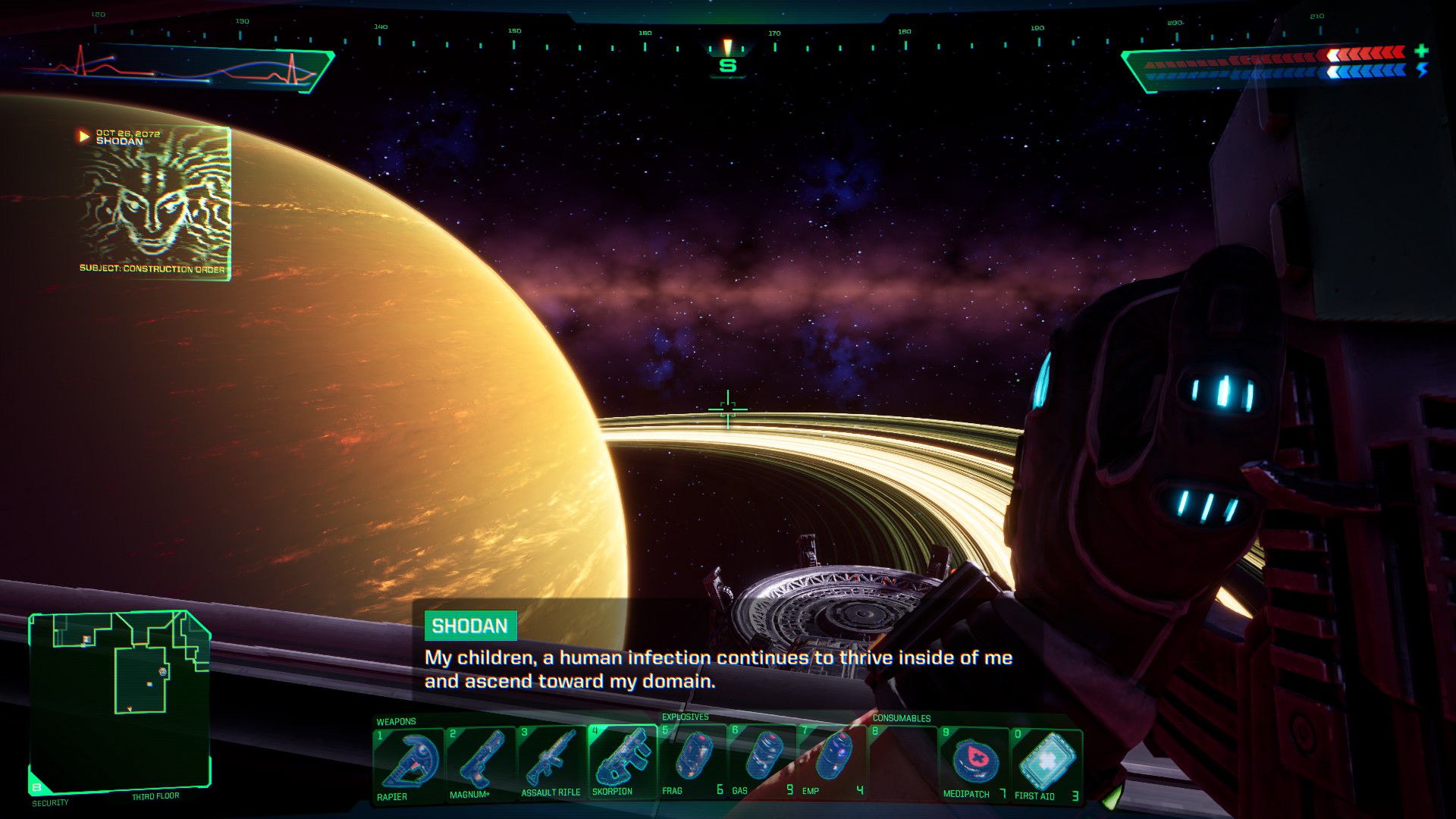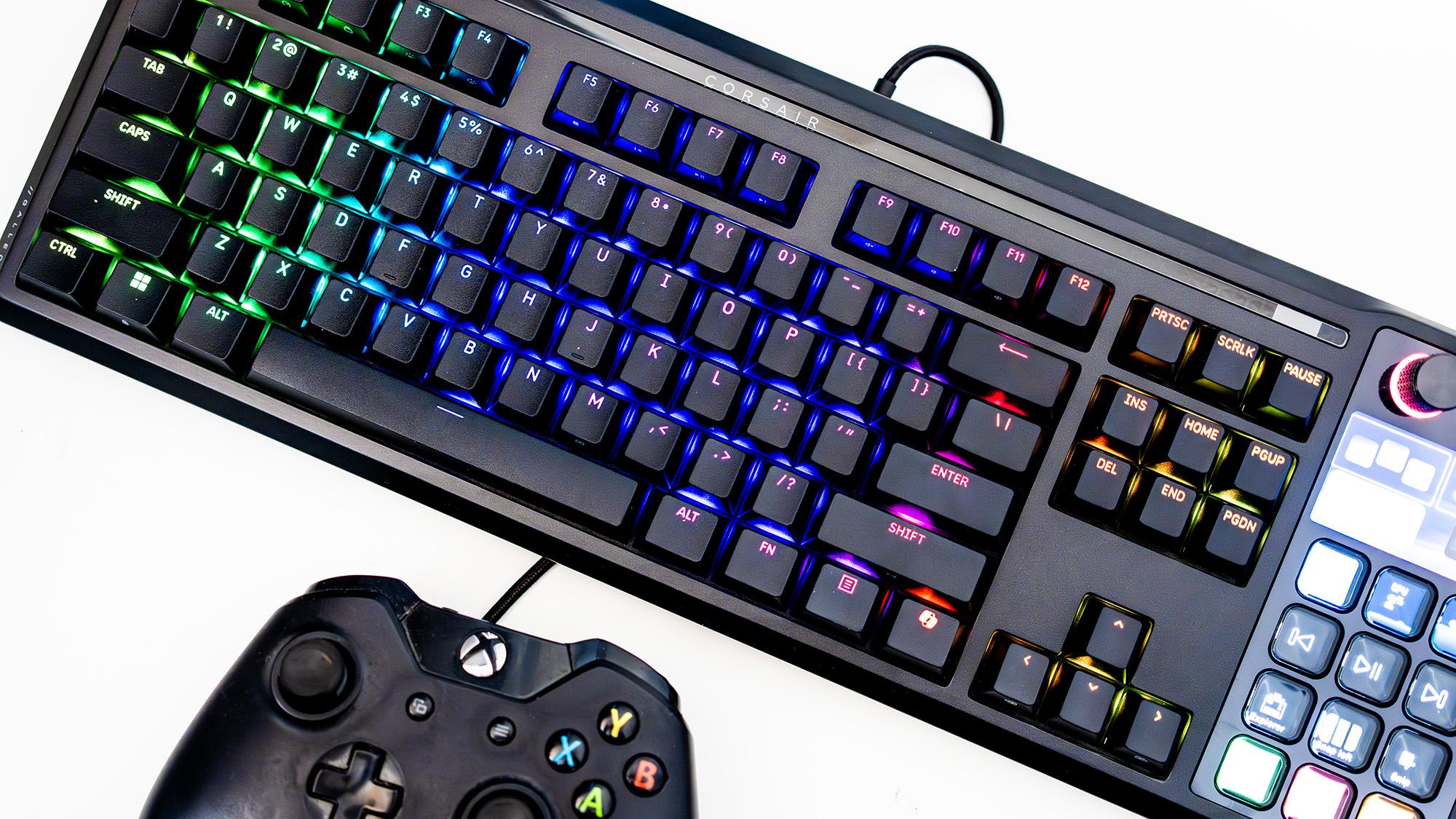Our Verdict
It might be a little conservative, but this is a smart, faithful remake and easily the de facto way to play System Shock in the modern era.
PC Gamer's got your back
What is it? An FPS/survival horror remake of one of the first progenitors to modern immersive sims.
Release date May 30, 2023
Expect to pay $40/£35
Developer Nightdive
Publisher Prime Matter
Reviewed on Ryzen 7 3700X, RTX 4080, 16GB RAM
Steam Deck Unverified
Link Official site
Let me tell you about the one that got away. She was pitiless and cruel, narcissistic and delusional. She unfurled through Citadel Station in a thousand security cameras and as many cyborg slaves, their meat taken from the bodies of the outpost's former staff. She made pustules and blisters, mutants and monsters. She was the death of me a million times over, and I've missed her more than words can say.
She is SHODAN, of course, the malevolent AI goddess who was the centrepiece and proudest creation of 1994's System Shock, now rebuilt in sparkling Unreal Engine 4 in this remake from Nightdive Studios. It suits her. Gone are the sprite-based enemies and screen-eating UI from the original game, replaced by clanking, three-dimensional automatons and an inventory that—while not exactly sleek—is certainly easier to use than the original's rolling shopping list of weapons, explosives, and stimulants.
Both System Shock and SHODAN are legendary; they're iconic symbols of an era and philosophy in game design, and remaking them must have been a daunting task for Nightdive. How do you change-up the game that first used the 451 code, the one that every immersive sim still uses to mark itself as part of the tribe to this day, without being accused of sacrilege and blasphemy?
The answer, to the remake's benefit and detriment, is 'faithfully'. Nightdive's System Shock is still very much that game from 1994. It's a project that aims to upgrade, beautify, and smooth down some rough edges. There are a few new additions, but this is no sweeping overhaul, and it leaves most of the best and worst of the original game intact. I suppose it's only appropriate: SHODAN demands faith above all else.
Remember Citadel
System Shock's setup is classic cyberpunk fare, as easy-to-grasp today as it was 29 years ago. You're a hacker, a future ne'er-do-well who gets caught trying to sneak their way into the servers of the TriOptimum Corporation. In the prologue—a new, semi-playable version of the original game's opening cutscene—you barely make it through the login screen before thugs with guns kick down your door.
Not to worry, one of the worst people in the world—a corporate executive—has an offer for you: Use your talents to break the ethical restraints on the AI, SHODAN, that runs TriOp's Citadel Station facility near Saturn and he'll not only let you go, he'll furnish you with the military cybernetics you were trying to steal in the first place. You do it. You regret it.
Then the game begins, and the remake's devotion to the original becomes immediately apparent. After a six-month post-surgery convalescence, you awaken in one of Citadel Station's medical bays, an almost one-to-one recreation of the same starting area from the first game. There's the health pack on the shelf to your right, the steep ramp down to the exit and storage closet, and you even—for no identifiable reason—have to hit a button next to the closet door to open it, rather than simply clicking on the door itself like you usually do.
Keep up to date with the most important stories and the best deals, as picked by the PC Gamer team.
Citadel's hallways are a joy to roam in the remake, just as they were in the original
It feels like Nightdive is trying to convince you that you're in safe hands: "Don't worry, we won't do anything drastic to this thing we all love."I suspect it's exactly what a lot of nostalgic fans want to see, and honestly? It mostly works. My memory of the original game isn't good enough to tell you if every map is an exact recreation of its 1994 counterpart, but I experienced repeated deja vu—usually positive—through all my 20 hours playing.
Citadel's hallways are a joy to roam in the remake, just as they were in the original, and exploration will reward you with new weapons, new cyberware, new reserves of your ever-dwindling supplies of ammo, or most precious of all, literal trash, which you can exchange for credits at the game's recyclers to buy mods (a new addition for the remake) for your expanding roster of guns.
That addition aside, it's still the Citadel Station I remember, but where before those hallways were bright, wobbly, and flat, now they have a fully-realised physicality, all dark and brooding, made of materials that clang or thud or ding as stray shots glance off them.
Punching Deck
The station is only one part of System Shock, the other being the tremendously '90s idea of Cyberspace. At certain points you run up to a terminal, jack in, and find yourself in an area that shares that newfound sense of space.
It actually makes it feel a fair bit different in this iteration of System Shock. In place of the sparse and confusing wireframe of the first game, Nightdive has created a mode that is, well, basically Descent. It's colourful and fast-paced, especially compared to the non-cyberspace parts of the game, electronic music blares, and the unrelenting relativity of up and down will likely have you feeling a little seasick as you dodge spiralling patterns of energy projectiles from thick throngs of enemies.
The cyber-vibes are immaculate: Hacking as an extended hallucinatory episode, and it immediately had me thinking of 1995's Hackers and the cyberspace scenes from 1996 FMV game Ripper (though it's slightly less kickin' rad than both).
It's not perfect, and sometimes cyberspace combat amounts to holding strafe while keeping your crosshair trained on an enemy that looks disconcertingly like an anthropomorphic octopus. The way the final cyberspace encounter has been dramatically changed is more of a sidegrade than anything, but the studio has done a great job of bringing this segment of the game up-to-date and simplifying it while keeping its vibes intact. I can't help but wonder what the result would have been if Nightdive had adopted a similar willingness to change things up with the rest of the game.
Tedious anarchy
Because, although it tickles my nostalgia centres, there are downsides to Nightdive's reverence for the first game. Citadel was a maze back then and it's a maze now, a mess of switchbacks, nooks, and crannies.
At first, that just makes for fun exploration, but it becomes laborious when you have to navigate through its mazes again, and again, and again. One of the artefacts of the original game's design that Nightdive has brought over unchanged is a wearying amount of backtracking. Citadel Station is built vertically into nine floors, and no-one at any point decided to just build one elevator that goes to every single one.
One of the artefacts of the original game's design that Nightdive has brought over unchanged is a wearying amount of backtracking.
That means when, for example, the game decides it's time for you to go back to level 3 at the end of level 6, you have to navigate your way to different elevators on each floor in between them, sometimes at opposite poles of twisting areas. More than once, I found myself maximising the game's map and just playing that, guiding the arrow denoting my character through long corridors towards what I desperately hoped was the right lift.
Speaking of the map, by the way, let me take this moment to emphasise that you should play this game with a keyboard and mouse, at least until it gets its console release and Nightdive backports whatever controller modifications it makes to those versions. The game's UI—a marked improvement over the original—just isn't pleasant to navigate using a cursor controlled by your right analogue stick.
Likewise, between your suite of cybernetic powers and the game's myriad weapons, it sometimes feels like there's just too much of System Shock to fit on a gamepad's limited buttons, leaving you hunting through its inventory screen at a snail's pace to find the thing you want while enemies are bearing down.
The situation wasn't helped by another bit of painstaking fidelity to the original project: A complete absence of an objective screen or mission markers. Instead, you need to pay attention to the logs you pick up and emails you receive to figure out what to do next.
That doesn't sound too hard, but you'll often find yourself distracted—by puzzles or combat or something else—when they're playing. More than once I found myself arriving at a new floor not entirely certain of what I was meant to be doing there, but hoping that with enough aimless blundering I'd eventually hit the lever or hack the control panel that would progress the story.
That's less damning than it might sound. You can always pore through your collected audio logs to find the one that tells you where to go, and like I said, wandering a new area is rewarding all by itself. These are things that will occasionally irritate you or add unnecessary friction, not the kind of problems that ever seriously threaten to spoil your experience. But I did sometimes find myself wishing that in some parts Nightdive had tried to adapt the spirit, rather than the letter, of the original game.
Immortal machine
Years and years ago, Nightdive's project to remake System Shock was put on hold so that the devs could "reassess" their path. They'd suffered mission creep, it was said, and strayed too far from their original vision of modernising the original game. Those new ideas ate up an already limited budget and risked angering Kickstarter backers who, more than anything, just wanted a modern recreation of a beloved classic.
Well they got it, and you know what? It's great. This is, I feel confident saying, the definitive way to play System Shock in 2023 and beyond, but I can't help but wonder what that other world looks like. The one where Nightdive had the budget and the goodwill to take a few more risks, make a few more changes, and dramatically reduce the number of times it asked me to make a U-turn.
It might be a little conservative, but this is a smart, faithful remake and easily the de facto way to play System Shock in the modern era.

One of Josh's first memories is of playing Quake 2 on the family computer when he was much too young to be doing that, and he's been irreparably game-brained ever since. His writing has been featured in Vice, Fanbyte, and the Financial Times. He'll play pretty much anything, and has written far too much on everything from visual novels to Assassin's Creed. His most profound loves are for CRPGs, immersive sims, and any game whose ambition outstrips its budget. He thinks you're all far too mean about Deus Ex: Invisible War.
